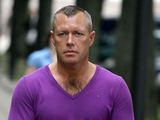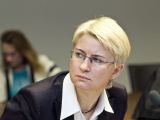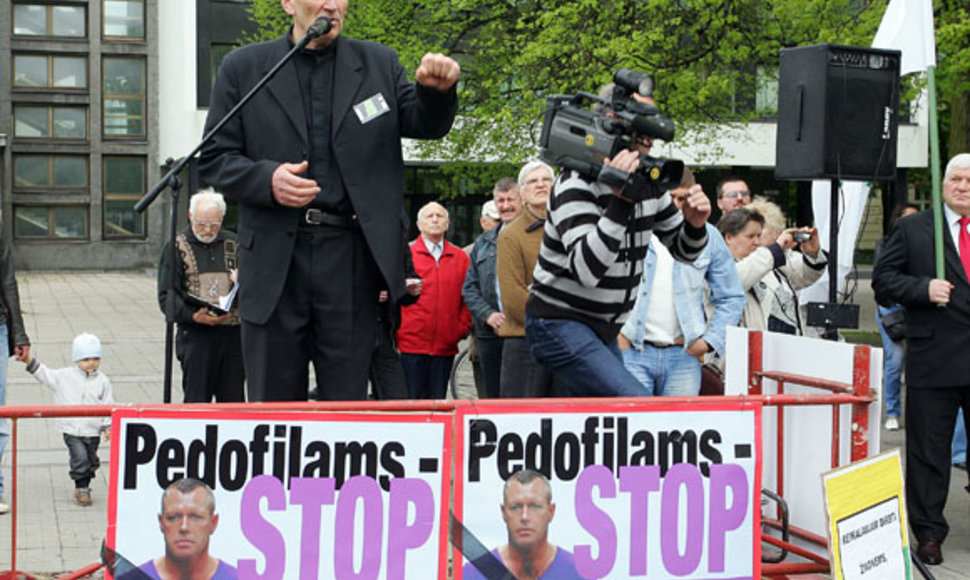'Our supreme governors, the mob' (Horace Walpole)
On 3 May, Lithuania played host to an international conference promoting democracy and the rule of law in Eastern Europe. US Senator and former presidential candidate John McCain was the conference’s guest of honour, rubbing shoulders with politicians from Belarus, Ukraine, Russia and Georgia.
 |
| M.Patašiaus/ „Lietuvos rytas“ nuotr. /Images of purple-clad Kedys have assumed iconic undertones. |
Events such as these do much to promote the image of the Baltic State as a role model for other former communist countries looking to make the transition to democracy. Indeed, this year the conference was organised to coincide with the 221st anniversary of the constitution adopted by the Polish-Lithuanian Commonwealth, one of the first constitutions in Europe.
However, the historical anniversary seems entirely out of touch with some of the more sober realities of life in today’s Lithuania, a nation seized by a political, legal and moral crisis.
The media frenzy
On Monday, Lithuanians face another anniversary; one more recent and much more relevant. On that day in 2010, the courts settled a long-running child custody battle, deciding that the six-year-old girl in question should live with her mother. Since then, however, the justice system has been unable to implement this decision.
Instead, the girl continues to be held in the house of the father’s family, isolated from her mother and kept from going to school. The house is surrounded by an organised and angry crowd of several hundred that has sustained a 24/7 vigil for months on end, determined to prevent the authorities from removing the child. The mob is apparently convinced that the mother has sold the child for sex and that she remains under the control of a powerful, global clan of paedophiles. The besieged house has become the centre of a sustained media frenzy and serves as the headquarters of a powerful populist movement.
The protesters are apparently receiving open and active support from the nation’s highest officials, including the current President and a former head of state. Political pressure from above, combined with popular revolt from below, has effectively paralysed the work of government institutions responsible for implementing the court order.
The girl continues to be held in the house of the father’s family, isolated from her mother and kept from going to school. The house is surrounded by an organised and angry crowd of several hundred that has sustained a 24/7 vigil for months on end.
The mother has filed a case with the European Court of Human Rights and is almost certain to win, according to Lithuania’s own representative to the court, Elvyra Baltutytė. But few expect the decision to change the reality on the ground, until somebody in authority gathers the courage to stand up to the mob. And with Parliamentary elections fast approaching, public courage is not likely to appear anytime soon.
The nightmare
The story began in a wealthy suburb of Kaunas, when Drąsius Kedys, a hard-nosed businessman with a passion for bodybuilding, launched a battle with his former partner Laima Stankūnaitė over custody of their daughter.
It was an uneven contest from the very start. Laima was not quite 16 when she embarked on a relationship with Drąsius, then 29. She came from a poor family with few connections; his family is rich and influential, including a sister who is a judge, a brother-in-law who is a former investigator from an organised crime unit and now a senior partner in a law firm, and a cousin married to an infamous criminal gang figure, to name but a few.
The couple split up and two years of legal wrangling over the custody of the daughter ensued. One day Kedys picked the child up from kindergarten and hid her away from her mother and social workers for several months. He then began to accuse the mother of selling their daughter to a group of paedophiles, allegedly including a local politician who had assisted the young mother to secure a lawyer for the custody case, a judge who worked in the same court as his sister, and a third person supposedly named by the child.
Kedys went to the local police. Without any investigation of the accusations, they issued him a note, certifying the allegations as a statement of fact. This document enabled him to secure a court order banning any further contact between the mother and her child. In less than two weeks, the child was officially transferred into the father’s custody.
Kedys also filmed his daughter as she provided a graphic account of sexual abuse. He gave the video to the media and posted it on the internet. With the help of his sister and brother-in-law, he filed several legal complaints, but the authorities did not act upon his allegations.
The killings
Everything went public when he took the law into his own hands and shot two people: Stankūnaitė’s sister, whom he accused of organizing contacts with the paedophiles, and the judge mentioned above. The killings caused a furore, largely in support of the murderer. Kedys became a national hero and symbol of rebellion against paedophiles and ‘the system.’
 |
| Irmanto Gelūno/15min.lt nuotr./Judge Neringa Venckienė, Kedys' sister, is said to be making plans to run for Parliament on 'anti-paedophile' platform. |
He went into hiding. Almost a year later he was found dead with high levels of alcohol in his blood. A post mortem carried out by the Lithuanian police with the assistance of external experts from Sweden came to the same conclusion on the cause of death: Kedys had been drinking heavily and choked on his own vomit. There were no signs of foul play. However, the majority of Lithuanians were convinced that he was killed by ‘the paedophiles.’
Even after Kedys had left the scene, the death toll continued to mount. The politician whom he had accused of paedophilia was found dead, apparently as the result of a motorcycle accident that occurred when he was intoxicated. Until his last day the politician vehemently denied any wrongdoing and was suing Kedys for slander. Soon after, the 24-year-old stepson of a colleague of Kedys’ sister (the judge) was also found dead. The police investigation concluded that the 24-year-old had apparently been tortured for several days and then shot.
These deaths caused a great stir in society and spawned a number of wild conspiracy theories about the involvement of the KGB, the Lithuanian secret services, and a powerful global clan of paedophiles.
The child’s filmed testimony has always been, and still is, the only evidence of any peadophile activity. According to one psychological assessment, she showed no more inclination to fantasise than other children her age. This would suggest that she is either telling the truth or was coached to say what she did. But for the majority of Lithuanians, the assessment was taken to confirm the truth of her filmed testimony: end of story.
The authorities have failed to discover the slightest trace of the alleged pedophile network. After a thorough examination of a 3000-page investigation, the courts determined that the mother was innocent of any wrongdoing and that the child had been taken away from her illegally.
Nonetheless, there is significant evidence suggesting that the father and his family have persuaded the child that her mother had handed her over to paedophiles, and would do so again, given the chance. Several months ago, the family took the child to a doctor to get a certificate that would excuse her from attending school. The doctor found no trace of illness, and refused to issue the certificate. According to the doctor’s evidence to the police, the family was infuriated, pointed at her and told the child to ‘remember the face of this woman. She is going to hand you over to men who will…[graphic description of sexual abuse].’
The nation’s fantasy
In all this time, the authorities have failed to discover the slightest trace of the alleged paedophile network. After a thorough examination of a 3000-page investigation, the courts determined that the mother was innocent of any wrongdoing and that the child had been taken away from her illegally. On 14 May 2010, the courts issued an order for the child to be returned to the mother. This order has been upheld on appeal, and the police officers who issued the false certificate to Kedys are now being tried.
However, public opinion has taken a different decision. The circulation of the video, accompanied by ‘expert’ speculation and wild conspiracy theories, reinforced the belief that the occult influence of a paedophile clan had reached the highest levels of the justice system in Lithuania and beyond. Most importantly, the public took the fact that Kedys killed two people as a sign of his moral conviction and the truth of his cause, as opposed to delusion, malice, or a combination of the two.
After Kedys was found dead, his sister the judge, Neringa Venckienė, picked up the torch of his battle, blaming ‘the system’ for her brother’s death and every possible evil. When her brother went underground, she assumed custody of her niece and has exploited the child to drive a populist media, and now political, campaign.
The girl is constantly shown on TV wearing a purple shirt like the one worn by her father, standing next to signs that read ‘stop the paedophile,’ and being encouraged to recall, relive and retell the details of her abuse. The public is in thrall to the incessant, titillating representation of the sexual abuse of a child in graphic, lurid detail. Among the many disturbing scenes broadcast repeatedly on national television was the spectacle of the six-year-old girl in front of a cheering crowd and being prompted to say that she does not want to return to her mother.
The girl is constantly shown on TV wearing a purple shirt like the one worn by her father, standing next to signs that read ‘stop the paedophile,’ and being encouraged to recall, relive and retell the details of her abuse. The public is in thrall to the incessant, titillating representation of the sexual abuse of a child in graphic, lurid detail.
The role of certain media outlets in provoking and perpetuating the wildest flights of public fantasy deserves separate mention. The third broadcast television channel TV3, owned by the Modern Times Group of Sweden, cashed in on stellar ratings for their ‘investigative news’ programmes that included a psychic revelation of the precise location where the sexual abuse had allegedly taken place. It would be hard to imagine the Modern Times Group pulling the same stunt in Sweden, but they apparently relax their standards of corporate governance and ethics when operating on the ‘frontiers’ of Europe.
The politician’s dream
Venckienė’s media campaign resonated powerfully in a country where paedophilia is routinely confused with homosexuality. It intensified popular hostility towards liberal causes like gay rights and expansive definitions of the family that are seen as imposed on Lithuanians by the ‘liberast’ (liberal + pederast) EU bureaucracy. Opportunist politicians have jumped on the bandwagon, and the key dividing line in Lithuanian politics is no longer between left and right, but between ‘Paedophiles’ and ‘Kedophiles.’
The Kedys family founded a political party in honour of their dead relative, called 'Drąsos Kelias', or the Path of Courage, and Venckienė has become one of the most influential media figures in the country. She published a book, toured the country to promote it, and is inciting mob justice. The media is speculating that she intends to run for Parliament, and her chances seem surprisingly strong. She enjoys the support of several radical and ultranationalist politicians, as well as protection from the most prominent politicians in the land.
Indeed, to the bewilderment of those with an elementary understanding of the rule of law and the separation of powers, the President rejected the formal recommendation of the Lithuanian College of Judges to revoke the immunity from prosecution that Venckienė enjoys as a judge. In flat contradiction to the opinion of the court and the vast majority of the legal community, the President said that Venckienė is not obstructing justice, but complying with the court order to transfer custody of the child to the mother.
But while the President at least makes an attempt to appear impartial on the underlying custody issue, Vytautas Landsbergis, Lithuania’s first head of state and now a Member of the European Parliament, has openly supported the Kedys family from the start. He has doubted the mother in published commentaries, insinuating that she sold her child to paedophiles and intends to do so again, and made bewildering misogynist statements implying her involvement in an abusive sexual relationship with the masked police guards assigned to protect her.
Furthermore, in a bizarre rhetorical twist, Landsbergis has likened the mob around the house to those Lithuanians who defended the TV tower in 1991 against Soviet troops, and the girl in the house to the student who was crushed by a tank and thus came to symbolise peaceful resistance to totalitarian rule. The image of the mob as inheriting the legacy of the anti-Soviet popular movement has taken hold of the public, and is reinforced by the participation of a growing number of former dissidents and members of the Catholic clergy (the leader of Drąsos Kelias is a priest).
The state in crisis
In the light of the President’s clear signal and the strong support of prominent politicians like Landsbergis, it is not surprising that virtually all government institutions, with the exception of the Ministry of Justice and the Children’s Ombudsman, have plunged their heads into the sand, and are busy passing the buck.
EU membership appears to have had done little to consolidate democracy and the rule of law in this formerly communist country, and it is hard to grasp how Lithuania will assume the EU Presidency next year.
For example, the Minister of Social Security declared that his institution is ‘not ready’ to implement the court order. Despite the court’s clear injunction to transfer the child immediately to the mother’s care, he said they prefer to await the opinion of the consultants from the Danish Federation of Social Educators, recruited by the supporters of the Kedys family. The Minister’s procrastination is quite easily explained. He is member of the conservative party, a resident of the rebellious neighbourhood of Garliava, and will soon be running for Parliament in this bastion of conservative sentiment.
In this context, Lithuanian commentators expect the court order will not be implemented, even if the European Court of Human Rights in Strasbourg supports the mother’s complaint. The situation has become hopelessly politicised, and all major political forces have an interest in prolonging the obstruction of justice, at least until the elections.
EU membership appears to have had done little to consolidate democracy and the rule of law in this formerly communist country, and it is hard to grasp how Lithuania will assume the EU Presidency next year. Arbitrary mob rule, executive interference with the judicial process, the corruption of government institutions and political parties all make for an extremely worrying spectacle.
And even if the President suddenly found the courage to stand up to the mob and defend the integrity of the state and the rights of citizens, it would be too late. This travesty of justice may already have had an enormous effect on the country, but for the child it is both terrible and irreversible.
Violeta Davoliute is a Brussels-based writer and researcher. She holds a PhD from the University of Toronto and is the project director for the Conflict and Culture Research Centre in Vilnius (ccrc.lt).















